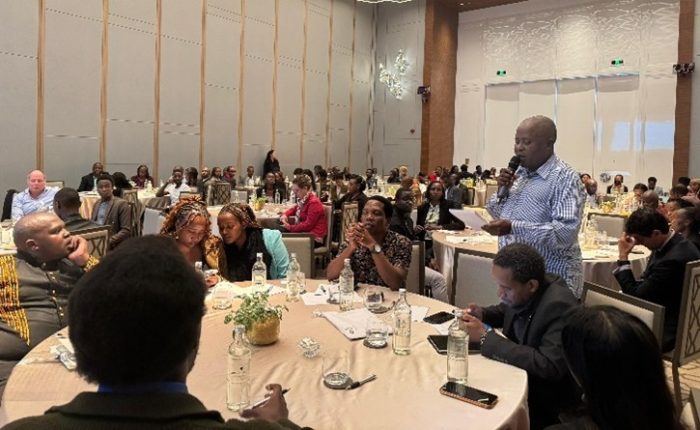Session 1 – Catalysing Sustainable Business in Kenya
This first multi-stakeholder session of the forum focused on exploring the critical role of business in contributing positively to sustainable development for people, communities, and the planet, while navigating an increasingly uncertain world.
Companies operating in Kenya, and across East Africa play a pivotal role in driving transformative change, not only through their regional headquarters and value chains, but also by shaping economies and impacting communities at scale. With growing influence across industries, these companies have the power to lead on sustainability, embedding action into their core business strategies. The session will also introduce the work of the World Benchmarking Alliance (WBA) and discuss how evidence and insights can be used to inform, support and – when needed – challenge companies in their sustainability performance.
Discussion points and summaries
Speakers highlighted that there is a need for businesses to help advance sustainable development in Kenya and across East Africa. This is especially important because many global companies are headquartered and operating in the region. Through their operations, their supply chains have employed and impacted the lives of many people, from local farmers to consumers to those working in corporations.
Participants, during the roundtables, noted that companies have been increasingly proactive in helping manage environmental, social, and governance (ESG) challenges in Kenya and East Africa. Some of the actions and resources that companies have been using include aligning local regulations and standards. Examples shared included some Kenyan regulators, such as the Kenya Capital Markets Act and the Capital Markets Authority (CMA), which has a corporate governance code. The CMA provides a framework for good governance, emphasizing that most company boards should have diversity and integrate strong accountability measures.

Picture: Opening the first session of the Action Forum in Nairobi, Kenya
Another point made was that companies listed on the Nairobi Securities Exchange are required to disclose manual guides and report on sustainability information. This helps ensure transparency around their material impacts, in line with international standards, and shows that companies are not only meeting legal requirements but are also building trust with the Kenyan public and their investors.
Another key takeaway from the roundtables was that Kenyan regulators have been encouraging robust ESG reporting because it is integral to incorporate governance and accountability. As a result, disclosures by Kenyan companies have improved, and many have been integrating global frameworks like the GRI Standards, the ISSB, and upcoming climate disclosure rules. This shows that Kenyan companies are adapting global standards to fit the local business environment.
Lastly, a point that came out strongly in the panels is that companies are being guided by data and external benchmarks to gauge and improve their sustainability performance. One example shared was how the Kenya National Human Rights Commission used WBA’s Corporate Human Rights Benchmark to rank Kenyan companies on their human rights performance. In conclusion, we see that local companies and organizations are starting to adopt WBA’s benchmarks.

Picture: Participants share their thoughts and responses in the roundtable section of the first session
Key takeaways
- Trust Deficit Across Institutions: Participants voiced a general mistrust in companies, media, and government institutions. When asked about which stakeholders they do trust, civil society organizations emerged as a trusted group, although this sentiment was not unanimous. There were also conversations about changing tends, where companies are now more willing to listen to CSOs, but questions remained around which forums or platforms are there for such convenings can happen safely and consistently.
- Lack of Accountability: A recurring theme throughout the discussions was the perceived lack of accountability across both public and private sectors, contributing to the erosion of stakeholder confidence.
- Information Credibility & Media Bias: Stakeholders highlighted concerns over the rise of fake news and the increasing difficulty in discerning credible information. Many expressed distrusts in traditional media outlets, citing inherent bias as a key issue.
- Role of social media: In response to declining trust in mainstream media, several participants noted a growing trend of citizens turning to social media as an alternative source of information—though this also presents its own set of credibility challenges.